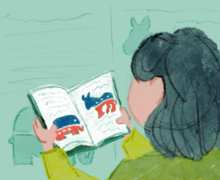Labor movement figures consider struggles, implications of modern unionization efforts
Emily Steinberger | Senior Staff Photographer
The panel, entitled “Labor’s Revival: Unions and the Struggle for Racial and Economic Justice,” discussed recent unionization efforts in the context of the labor movement's history.
To support student journalism and the content you love, become a member of The Daily Orange today.
At Amazon, employees are tracked from the moment they clock in to the time they clock out. If they don’t make their daily rate, they are replaced, and they barely have break time to go to the bathroom, said Chris Smalls, a former Amazon worker.
“What goes on behind the scenes is pretty much intolerable. It’s really inhumane,” said Smalls, the president of the Amazon Labor Union. “They know that workers really don’t have any power. The only thing we can do to save the world is hold our labor.”
The panel featured Smalls as well as Jaz Brisack, an organizer with Starbucks Workers United, and Johnnie Kallas, the director at the Cornell University School of Industrial and Labor Relations Labor Action Tracker. The group discussed their personal experiences as well as the U.S. labor movement overall.
Gretchen Purser, an associate professor of sociology at SU, opened the event by acknowledging that the United States’ economy grew out of labor from enslaved Africans and immigrants. All wealth is created from labor, she said.
“Our institutions rely upon and are organized upon the unrecognized and unpaid labor of caregivers,” Purser said.
Labor unions in the U.S. are at a transformative point, especially after employees with companies like Starbucks and Amazon unionized in 2021 and 2022, respectively, Kallas said. Still, employees now have a much harder time unionizing than in the 1970s given labor oppression and other obstacles, he said.
Despite the increase of strikes in the past few years, official data sources, such as the U.S. Bureau of Labor Statistics, are not thorough in documenting strikes, Kallas said. But the Cornell ILR’s Labor Action Tracker, which aims to document the full extent of strikes across the U.S., create a comprehensive database and amplify the voices of striking workers, helps fill those gaps, he said.

Starbucks has been a “trendsetter” in busting unions and has inspired other companies to follow suit, Brisack said. She said the company’s strong anti-labor presence seems surprising because its culture appears to revolve around creating a welcoming work environment for employees of all backgrounds.
All three panelists said racial injustice and the labor rights movement are interconnected. Brisack said the first strikes were among enslaved workers, which she said people don’t talk about enough. A majority of current Amazon employees are Black and brown, Smalls said.
“Racism is violence, and poverty is violence,” Kallas said. “There’s no labor justice without racial justice.”
After protests broke out in the wake of the murder of George Floyd, Starbucks banned Black Lives Matter apparel, claiming it violated the dress code. When employees threatened to boycott, Starbucks agreed to change the rule, but encouraged workers to wear BLM t-shirts the company provided for free. Although the gesture seemed positive, Brisack said, it felt like a performative tactic.
“The kind of people who had gravitated toward working at Starbucks were exactly the kind of people who believed in social justice,” Brisack said.
Our institutions rely upon and are organized upon the unrecognized and unpaid labor of caregiversGretchen Purser, SU associate professor
Despite all of the challenges to the labor rights movement, Brisack said employers can take actions to support their workers, and she emphasized the importance of whistleblowers fighting corrupt corporations from the inside. Overall, Smalls said people can do better to hold corporations accountable, and employers can do more to support their workers.
“As a manager, just take care of your people. It’s that simple,” Smalls said.
Consumers can fight for labor rights while also supporting their communities, Smalls said. Instead of buying from Amazon, shoppers can help preserve local economies and businesses by shopping locally at places like Destiny USA, which he said is now barren compared to a decade ago. Amazon opened a distribution center in June about 15 miles north of Syracuse.
“By giving our money to one company, we’re destroying our own communities,” Smalls said.
Kallas urged unions and employees to continue their efforts. He said strikes are never illegal, they just might be unsuccessful. Ultimately, Smalls said, unions illustrate the importance of coming together to support a common and crucial cause.
“We didn’t have anything. We were just ordinary people that came together and said we’re going to form this worker union,” Smalls said. “That right there showed and proved that no amount of money in the world can stop the power of people when they come together.”
Published on October 25, 2022 at 12:24 am
Contact Emily: emilyrosesteinberger@gmail.com | @madlehead





